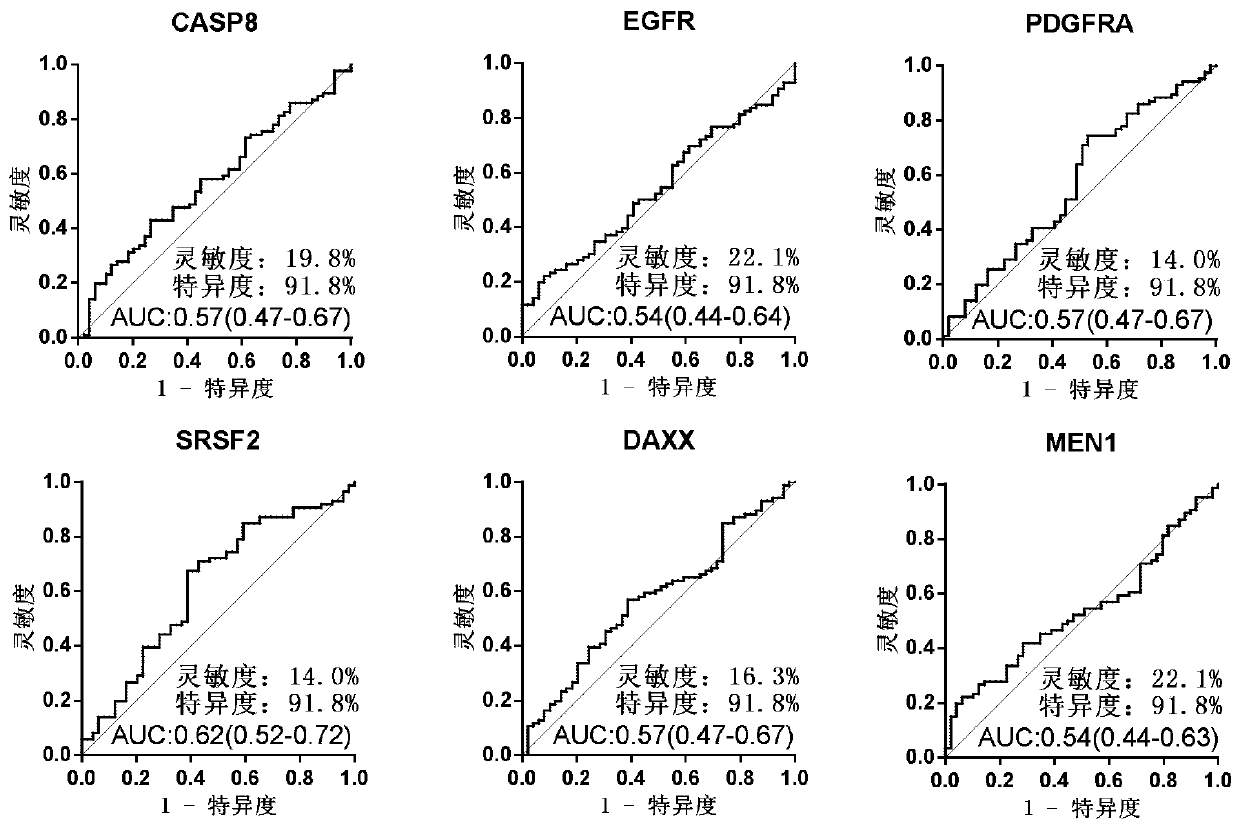Serum protein marker for early screening and diagnosis of esophageal squamous carcinoma, kit and detection method
A serum protein and esophageal squamous cell carcinoma technology, applied in the field of biomedicine, can solve the problems of poor diagnostic ability of the diagnostic index tumor, the application of a single anti-TAA autoantibody, and the low frequency of occurrence, and achieves low cost, high sensitivity, and good reference. effect of value
- Summary
- Abstract
- Description
- Claims
- Application Information
AI Technical Summary
Problems solved by technology
Method used
Image
Examples
experiment example
[0050] 1 Preparation of serum samples
[0051] 1.1 Serum samples for protein chip experiments
[0052] Patients with primary esophageal squamous cell carcinoma (esophageal squamous cell carcinoma diagnosed by pathology) were collected in Beijing You'an Hospital and the First Affiliated Hospital of Zhengzhou University, with patient consent and approval by the Institutional Review Board and the Hospital Ethics Committee. For all samples, 5-10mL of whole blood was collected in red-headed blood collection tubes. After standing at room temperature for 2 hours, centrifuge at 1000xg for 15 minutes, take the supernatant, divide each sample into several copies, label them, and store them in a low-temperature refrigerator at -80°C. , avoid repeated freezing and thawing.
[0053] According to epidemiological analysis, 86 cases of primary esophageal squamous cell carcinoma sera and 50 normal control sera from You'an Hospital were collected for preliminary microarray screening. Among th...
Embodiment
[0116] A serum protein marker for early screening and diagnosis of esophageal squamous cell carcinoma, the serum protein marker is a combination of proteins encoded by P53, GNA11, GNAS, EGFR, SRSF2, MEN1 and DAXX genes;
[0117] The protein encoded by the P53 gene has the amino acid sequence shown in SEQ ID NO.1;
[0118] The protein encoded by the GNA11 gene has the amino acid sequence shown in SEQ ID NO.2;
[0119] The protein encoded by the GNAS gene has the amino acid sequence shown in SEQ ID NO.3;
[0120] The protein encoded by the EGFR gene has the amino acid sequence shown in SEQ ID NO.7;
[0121] The protein encoded by the SRSF2 gene has the amino acid sequence shown in SEQ ID NO.9;
[0122] The protein encoded by the MEN1 gene has the amino acid sequence shown in SEQ ID NO.10;
[0123] The protein encoded by the DAXX gene has the amino acid sequence shown in SEQ ID NO.11.
[0124] A kit, including serum protein markers for early screening and diagnosis of esophagea...
PUM
| Property | Measurement | Unit |
|---|---|---|
| Sensitivity | aaaaa | aaaaa |
| Sensitivity | aaaaa | aaaaa |
| Sensitivity | aaaaa | aaaaa |
Abstract
Description
Claims
Application Information
 Login to View More
Login to View More - R&D
- Intellectual Property
- Life Sciences
- Materials
- Tech Scout
- Unparalleled Data Quality
- Higher Quality Content
- 60% Fewer Hallucinations
Browse by: Latest US Patents, China's latest patents, Technical Efficacy Thesaurus, Application Domain, Technology Topic, Popular Technical Reports.
© 2025 PatSnap. All rights reserved.Legal|Privacy policy|Modern Slavery Act Transparency Statement|Sitemap|About US| Contact US: help@patsnap.com



